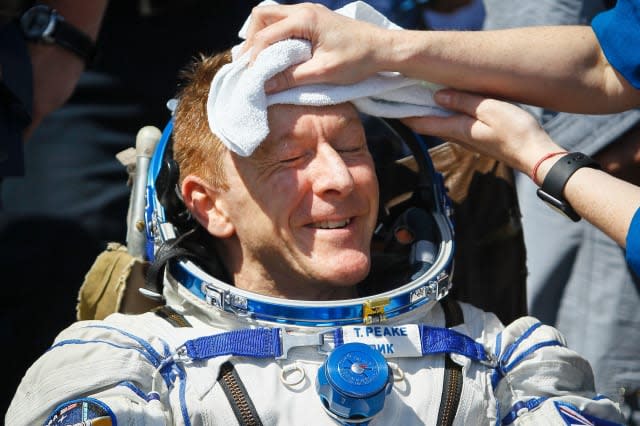Tim Peake: Readjusting to Earth feels like 'world's worst hangover'

British astronaut Tim Peake has said he feels like he is having the "world's worst hangover" as his body adjusts to life on Earth.
Dizziness and a sense of vertigo have plagued Major Peake since his return from space on Saturday morning.
The symptoms are expected for anyone who has spent a sustained period of time in zero gravity.
Major Peake, 44, told ITV News: "You're excited to be back, but you can't fully enjoy the experience because, to be quite frank, you feel pretty terrible.
"It can only be described as something akin to the world's worst hangover in terms of the everything that is going on in your head."
Despite only being back on the planet for a matter of hours, Major Peake admitted the biggest thing he would miss was the view from the International Space Station (ISS).
"The view of Earth is the biggest thing, and it is probably the thing that has the biggest impact on you, so it is quite natural that is the thing you will miss the most," he added.
During his 186 days on the ISS the former helicopter test pilot and father of two participated in more than 250 scientific experiments, performed a spacewalk, ran the London Marathon on a treadmill, and inspired more than a million schoolchildren with educational outreach activities.
His achievements earned him a Queen's Birthday Honour that was out of this world - Companion of the Order of St Michael and St George for "extraordinary service beyond our planet".
On Saturday Major Peake and his crewmates - American Nasa astronaut Colonel Tim Kopra and Russian cosmonaut Yuri Malenchenko - made the trip back to Earth in a tiny Soyuz space capsule measuring just over 6ft across.
As they plunged through the atmosphere, friction on the craft's forward-facing heat shield slowed its speed from 17,398mph to 514mph and raised the temperature to a scorching 1,600C.
The rapid deceleration pushed the crew back into their shock-absorbing seats with a force of up to 5G - five times normal Earth gravity.
After a journey lasting less than an hour, the Soyuz TMA-19M descent module parachuted down to a remote spot on the vast Kazakhstan steppe to make a "bull's-eye" landing. One second before touchdown, a burst of fire from six retro rockets beneath the capsule reduced the impact speed to 3mph.
Major Peake was the first British astronaut to be sent to the ISS by the European Space Agency.
His mission was named Principia after Sir Isaac Newton's landmark work describing the laws of motion and gravity.
On July 7 another trio of space travellers - American Kate Rubins, Russian Anatoly Ivanishin and Japanese astronaut Takuya Onishi - will fly to the space station from the Baikonur cosmodrome in Kazakhstan. They will travel in a new upgraded version of the Soyuz, the MS-01, which has improved computer and avionics systems.


